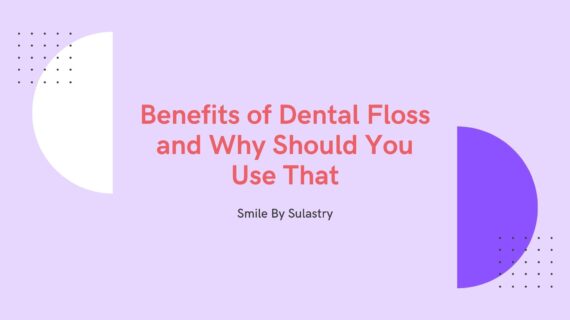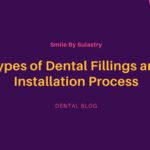Benefits Of Dental Floss – Dental floss or flossing is a fairly effective cleaning tool other than using a toothbrush. Most people often combine the toothbrush method with the use of flossing to avoid bacteria and spots that stick to the teeth. To find out more about the benefits of dental floss and when is the right time to use dental floss, see the article below until it runs out.
Using dental floss regularly and under control plays a very important role in the hygiene of your teeth. If you don’t floss, plaque or dirty spots can build up between your teeth and along your gum line. Over time, this can lead to disease in your teeth and disease in the gums.
Interdental cleaners such as dental floss play an important role in removing plaque and dirt from ordinary areas that cannot be reached using a toothbrush.
Why is flossing so important? By flossing, you remove plaque and food particles between your teeth and gums, and help prevent gingivitis and other gum diseases. Gum Disease On average, adults have some form of gum disease. And it’s not just parents. Gum disease can start at a very early age if possible, especially if you don’t have a proper oral and dental care routine, which includes flossing your teeth every day.
Also Read Dental Crown Tips, Before And After You Using It
How Does Flossing Help Your Gums?
Although periodontal disease is not the leading cause of pulp death, chronically unhealthy gums can usually increase the risk of tooth loss or damage to root canals. While brushing your teeth twice a day is essential for good oral hygiene, brushing alone may not protect you from gum disease and the tooth decay it can cause.
Many people who have sensitive or bleeding gums may be tempted to avoid flossing for fear of making their bleeding gums worse. But in fact, dental floss can improve the health of your gums, thereby helping prevent them from bleeding that is harmful to your gums and teeth.
In fact, flossing your teeth every day, combined with brushing and rinsing, can help protect against gingivitis by removing plaque and food particles that stick to teeth, maintaining healthy teeth and gums, while allowing you to smile beautifully without fear of being seen. dirty teeth. Flossing is essential for healthy teeth and your smile, no matter what age you are. And even kids should familiarize themselves with a routine of healthy oral and dental care.
Flossing is one step to maintain healthy gums to avoid various gum diseases. Correct prevention starting with dental floss is actually quite simple. Flossing is a step that can help prevent signs and symptoms of gingivitis by removing plaque. Combined with brushing and using a toothbrush every day, you can keep your smile healthy and pleasing to the eye forever.
What are The Benefits of Dental Floss ?
Digging through leftover food or removing vegetable scraps from between your teeth feels really good.
Apart from helping your teeth and gums look and feel good, flossing has many other benefits as well. What are the benefits of Dental Floss?
-
Removes plaque
Plaque is a colorless, sticky layer that is usually present and collects around or between the teeth along your gum line. Although it is quite difficult to see, plaque is not something you want to linger in your mouth or between your gums.
Initially, this plaque forms around your teeth when bacteria in your mouth mix with starchy or sweet foods and drinks. These bacteria release acids that break down carbohydrates. If you don’t brush your teeth properly, bacteria, acids, and carbohydrates can mix to form a layer of plaque around your teeth and along your gum line.
The bacteria in plaque can release acids that can attack the enamel on your teeth. If this enamel is not removed cleanly through brushing and flossing, it can cause cavities over time.
To make matters worse, the plaque buildup can harden and turn into tartar, which collects along your gum line. When this happens, you will increase your risk of developing disease in your gums.
Using dental floss properly and regularly throughout the day, will be able to remove food particles that have accumulated and stuck from around your teeth, as well as plaque that has accumulated around your teeth.
-
Can Reduce Bad Breath
Bad breath (halitosis) is a common problem that most people experience. But you don’t need to worry because dental floss is one of the tools you can use to reduce bad breath.
When food gets stuck between your teeth, it will slowly start to rot on its own. If you don’t remove food debris, it can cause you to have a definite bad breath.
If plaque builds up around or between the teeth and begins to erode around the teeth, it can lead to at least cavities and other gum disease.
-
Helps Prevent Other Gum Diseases
Gingivitis is an early stage of gum disease. One of the first signs of gingivitis is inflammation around your gums. Your gums can also bleed when you brush or floss your teeth.
If gingivitis is not treated properly and properly, it can lead to a more serious infection known medically as periodontitis. This disease can cause your gums to shrink or, worst of all, come apart from your teeth. Your teeth may lose bone support and become a little loose. If left untreated, periodontitis can cause an inflammatory response throughout your body.
Brushing your teeth twice a day and flossing your teeth once a day can help reduce the risk of gum disease. Professional cleaning performed by your dentist every 6 months can also help keep your gums healthy.
-
Reduces the Risk of Cavities
Damage to your teeth can lead to cavities, which cause tiny holes in the hard surface of your teeth called enamel.
Although this process takes time, the more plaque you have on your tooth enamel, the higher your risk of developing cavities.
Flossing your teeth at least once a day can help get rid of hidden food particles and plaque buildup, and reduce the risk of tooth decay.
In addition, dental floss is disposable only, so you have to throw it away so you don’t reuse it.
According to the researchers, the right time to floss is before brushing your teeth. If you forget the sequence, you don’t need to panic and floss your teeth as usual, either after or before brushing your teeth so that you can get the benefits.
References :




